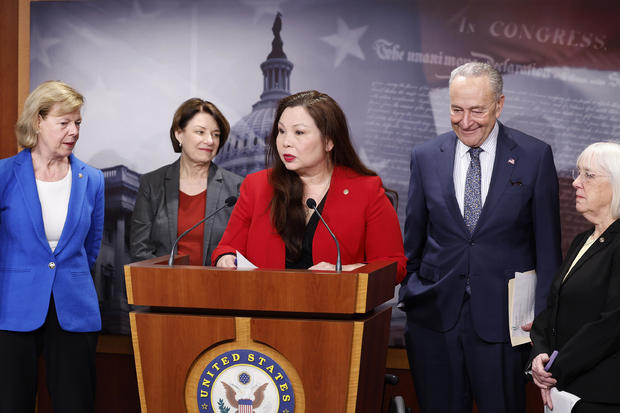Senate Democrats to unveil package to protect IVF as party makes reproductive rights push this month
Washington — A group of Senate Democrats is set to unveil a new package to protect access to IVF on Monday, as the party makes a push around reproductive rights this month — two years after the Supreme Court overturned Roe v. Wade.
An Alabama high court decision earlier this year brought attention to IVF as a possible new front in the fight over reproductive rights in the U.S. when the court deemed that embryos are children under state law and prompted providers to halt fertility treatments. Though the state legislature moved to protect access to the procedure, Democrats quickly put the blame on Republicans as the development raised concern about similar moves elsewhere.
"In the nearly two years since the Supreme Court threw out Roe v. Wade, our nation has seen the horrific consequences of Republicans' anti-science, anti-woman crusade that has put IVF at risk for millions of Americans who rely on it to start or grow their family," Sen. Tammy Duckworth, an Illinois Democrat who is among the group leading the push on the package, said in a statement to CBS News.
The package, called the Right to IVF Act, is made up of four bills sponsored by Duckworth, Sen. Patty Murray of Washington and Sen. Cory Booker of New Jersey that center on a right to receive and provide IVF services, while working to make the treatments more affordable. But some of the measures have previously been blocked by Senate Republicans, making it unlikely the package would pass the upper chamber.
Among the measures in the package is the Access to Family Building Act, which would create a statutory right for access to assisted reproductive services like IVF. Duckworth tried to secure passage of the bill in February under unanimous consent, but one Republican senator objected, claiming that it would go too far.
The package also includes a measure geared toward expanding access to the fertility treatments for veterans, which was likewise blocked by a Republican senator earlier this year. And other measures among its contents work to lower costs for Americans by requiring insurance plans to cover IVF.
The legislation comes as Senate Majority Leader Chuck Schumer has outlined plans for the chamber to put reproductive rights "front and center" this month, like with action slated on a bill to protect access to contraception. Democrats have tried to put Republicans on the record over issues like IVF and contraception along with abortion after it became a major motivator for voters at the polls in the midterm elections.
"Democrats will never relent until we reverse the immense damage that the Supreme Court has inflicted on this country, and the American people have a right to know where their elected officials stand on protecting the rights and reproductive care," Schumer said on the Senate floor as he teased the efforts late last month.
Though Senate Republicans have largely expressed support for IVF in the wake of the Alabama ruling, lawmakers appear to be at odds over a path forward that would satisfy both parties. Two Senate Republicans, Sens. Ted Cruz of Texas and Katie Britt of Alabama, introduced legislation to protect access to IVF last month, urging bipartisan support. But the bill was quickly met with pushback by Democrats, who questioned its scope and mechanism.
Known as the IVF Protection Act, the GOP bill would require that states "do not prohibit in vitro fertilization" as a condition for the states to receive federal funding for Medicaid, which provides health insurance for low-income Americans. But the bill doesn't compel an organization or individual to provide IVF services, and it doesn't preclude states from otherwise regulating IVF, and possibly regulating in ways at odds with Democrats' wishes.
Murray said in a statement that the GOP legislation would not protect IVF, calling it a "PR tool for Republicans to hide their extremism." In contrast, the Washington Democrat said that the new Democratic package "would actually protect Americans from attempts to restrict IVF," while expanding access by lowering costs.








